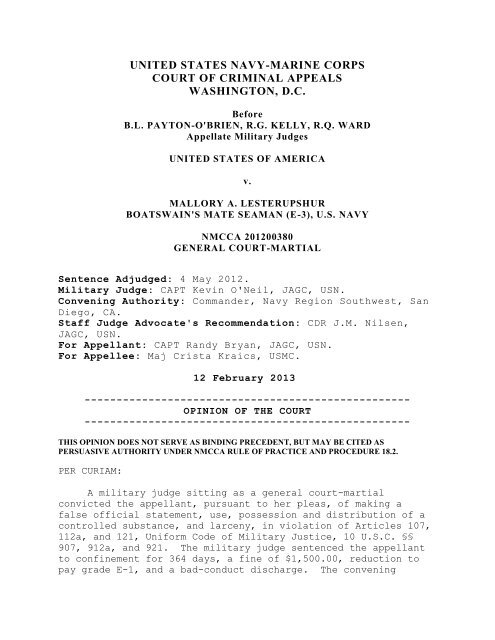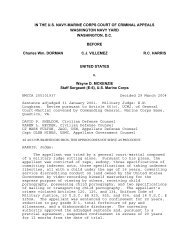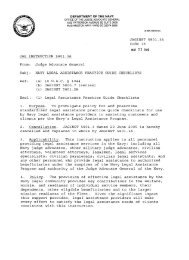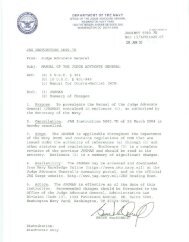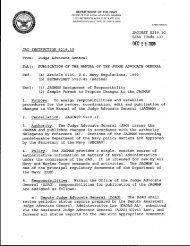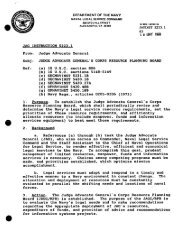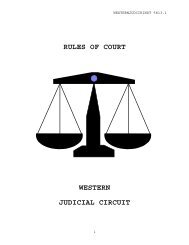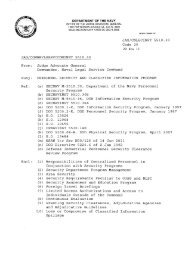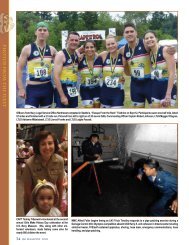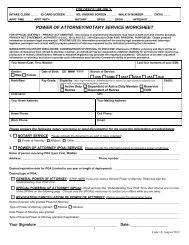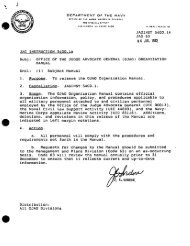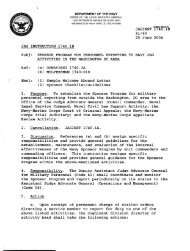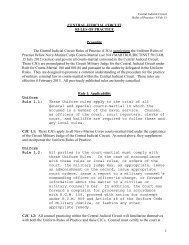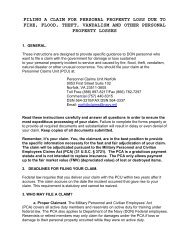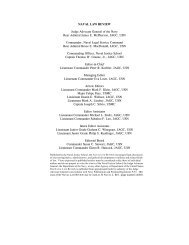Download - U.S. Navy Judge Advocate General's Corps
Download - U.S. Navy Judge Advocate General's Corps
Download - U.S. Navy Judge Advocate General's Corps
Create successful ePaper yourself
Turn your PDF publications into a flip-book with our unique Google optimized e-Paper software.
UNITED STATES NAVY-MARINE CORPS<br />
COURT OF CRIMINAL APPEALS<br />
WASHINGTON, D.C.<br />
Before<br />
B.L. PAYTON-O'BRIEN, R.G. KELLY, R.Q. WARD<br />
Appellate Military <strong>Judge</strong>s<br />
UNITED STATES OF AMERICA<br />
v.<br />
MALLORY A. LESTERUPSHUR<br />
BOATSWAIN'S MATE SEAMAN (E-3), U.S. NAVY<br />
NMCCA 201200380<br />
GENERAL COURT-MARTIAL<br />
Sentence Adjudged: 4 May 2012.<br />
Military <strong>Judge</strong>: CAPT Kevin O'Neil, JAGC, USN.<br />
Convening Authority: Commander, <strong>Navy</strong> Region Southwest, San<br />
Diego, CA.<br />
Staff <strong>Judge</strong> <strong>Advocate</strong>'s Recommendation: CDR J.M. Nilsen,<br />
JAGC, USN.<br />
For Appellant: CAPT Randy Bryan, JAGC, USN.<br />
For Appellee: Maj Crista Kraics, USMC.<br />
12 February 2013<br />
---------------------------------------------------<br />
OPINION OF THE COURT<br />
---------------------------------------------------<br />
THIS OPINION DOES NOT SERVE AS BINDING PRECEDENT, BUT MAY BE CITED AS<br />
PERSUASIVE AUTHORITY UNDER NMCCA RULE OF PRACTICE AND PROCEDURE 18.2.<br />
PER CURIAM:<br />
A military judge sitting as a general court-martial<br />
convicted the appellant, pursuant to her pleas, of making a<br />
false official statement, use, possession and distribution of a<br />
controlled substance, and larceny, in violation of Articles 107,<br />
112a, and 121, Uniform Code of Military Justice, 10 U.S.C. §§<br />
907, 912a, and 921. The military judge sentenced the appellant<br />
to confinement for 364 days, a fine of $1,500.00, reduction to<br />
pay grade E-1, and a bad-conduct discharge. The convening
authority approved the adjudged sentence, but suspended the fine<br />
and confinement in excess of nine months, and waived automatic<br />
forfeitures.<br />
The appellant asserts that her pleas were improvident based<br />
upon a material misunderstanding of a term of her pretrial<br />
agreement (PTA). After careful consideration of this sole<br />
assignment of error, we conclude that the matter raised by the<br />
appellant is unfounded in fact 1 and does not merit either relief<br />
or further analysis. 2 United States v. Matias, 25 M.J. 356, 363<br />
(C.M.A. 1987).<br />
Upon our review of the record of trial, we conclude that<br />
the findings and the sentence are correct in law and fact, and<br />
that no error materially prejudicial to the substantial rights<br />
of the appellant exists. Arts. 59(a) and 66(c), UCMJ. We<br />
affirm the findings and sentence as approved by the convening<br />
authority.<br />
For the Court<br />
R.H. TROIDL<br />
Clerk of Court<br />
Contrary to the appellant’s assertion, the pretrial agreement required the<br />
convening authority to suspend only adjudged forfeitures provided the<br />
appellant established a dependent’s allotment. As the appellant was beyond<br />
her expiration of active obligated service (EAOS), the agreement provided no<br />
protection against automatic forfeitures. After announcing the sentence, the<br />
military judge specifically explained the effect of the pretrial agreement on<br />
the adjudged sentence, “Automatic forfeitures will apply to the period in<br />
which you are confined. However, as I previously explained to you earlier<br />
this afternoon, you are beyond your EAOS. During any confinement you must<br />
serve you are not entitled to pay during that period of confinement.” Record<br />
at 122. The appellant expressed understanding of the consequences of her<br />
EAOS and her receipt of pay. Id. at 53.<br />
2<br />
Since the record reflects that the appellant was beyond her EAOS at the time<br />
of her court-martial and that there was no PTA term addressing automatic<br />
forfeitures, we are perplexed by the defense counsel’s clemency request which<br />
requested, inter alia, waiver of automatic forfeitures. We are similarly<br />
perplexed by the staff judge advocate’s addendum indicating that a term of<br />
the PTA was to defer and waive automatic forfeitures, and the CA’s action in<br />
attempting to waive forfeitures. Furthermore, contrary to both parties’<br />
assertion, the record is void of any agreement that the convening authority<br />
would protect the appellant from automatic forfeitures.<br />
2


